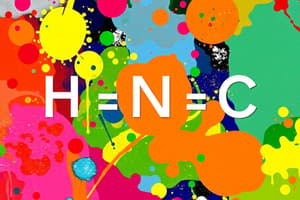Podcast
Questions and Answers
What is the term for a negatively charged ion?
What is the term for a negatively charged ion?
- Oxide ion
- Phosphide ion
- Cation
- Anion (correct)
Which element forms the anion with the name 'nitride ion'?
Which element forms the anion with the name 'nitride ion'?
- Nitrogen (correct)
- Chlorine
- Bromine
- Fluorine
What is the charge on the strontium ion?
What is the charge on the strontium ion?
- +1
- +2 (correct)
- +3
- -2
Which statement about ions is true?
Which statement about ions is true?
What is the correct formula for the compound formed by sodium and bromine ions?
What is the correct formula for the compound formed by sodium and bromine ions?
What is the purpose of chemical nomenclature?
What is the purpose of chemical nomenclature?
Why do chemists prefer systematic names over common names?
Why do chemists prefer systematic names over common names?
What organization devised the present system of inorganic chemical nomenclature?
What organization devised the present system of inorganic chemical nomenclature?
What is the formula for most elements?
What is the formula for most elements?
Which elements are found in nature as diatomic molecules?
Which elements are found in nature as diatomic molecules?
Why do chemists prefer systematic names over common names?
Why do chemists prefer systematic names over common names?
What class of names are common names?
What class of names are common names?
Which organization devised the present system of inorganic chemical nomenclature?
Which organization devised the present system of inorganic chemical nomenclature?
What is the purpose of chemical nomenclature?
What is the purpose of chemical nomenclature?
What is the formula for most elements?
What is the formula for most elements?
What is the name of the anion formed from sulfur?
What is the name of the anion formed from sulfur?
Which element forms the cation with a +2 charge?
Which element forms the cation with a +2 charge?
What is the name of the anion formed from barium?
What is the name of the anion formed from barium?
Which group of elements is likely to form ions with a -3 charge?
Which group of elements is likely to form ions with a -3 charge?
What is the correct formula for the compound formed by magnesium and oxygen ions?
What is the correct formula for the compound formed by magnesium and oxygen ions?
Flashcards
Anion
Anion
A negatively charged ion formed by gaining electrons.
Nitride ion
Nitride ion
The anion formed from nitrogen with a -3 charge.
Charge on strontium ion
Charge on strontium ion
The charge on the strontium ion is +2.
Ions
Ions
Signup and view all the flashcards
Sodium bromide formula
Sodium bromide formula
Signup and view all the flashcards
Chemical nomenclature
Chemical nomenclature
Signup and view all the flashcards
Systematic names
Systematic names
Signup and view all the flashcards
IUPAC
IUPAC
Signup and view all the flashcards
Formula for most elements
Formula for most elements
Signup and view all the flashcards
Diatomic molecules
Diatomic molecules
Signup and view all the flashcards
Common names
Common names
Signup and view all the flashcards
Sulfide ion
Sulfide ion
Signup and view all the flashcards
Strontium cation
Strontium cation
Signup and view all the flashcards
Bariumide ion
Bariumide ion
Signup and view all the flashcards
Ions with -3 charge
Ions with -3 charge
Signup and view all the flashcards
Formula of magnesium oxide
Formula of magnesium oxide
Signup and view all the flashcards
Study Notes
- Chemical nomenclature is the system used by chemists to identify compounds, with two classes of names: common and systematic.
- Common names are arbitrary and based on outstanding properties, while systematic names precisely identify chemical composition.
- Systematic names were devised by the International Union of Pure and Applied Chemistry (IUPAC).
- Elements: most have formula equal to symbol, some are diatomic (H2, N2, O2, F2, Cl2, Br2, I2).
- Two elements, sulfur and phosphorus, are commonly polyatomic.
- Ions are formed by adding or removing electrons from atoms, forming cations (positive ions) or anions (negative ions).
- Cations are named after their parent atoms (Na+ is sodium ion, Ca2+ is calcium ion).
- Anions are named by adding –ide to the stem of the parent element (F- is fluoride ion, Cl- is chloride ion).
- Ions formed by adding electrons are called anions, those formed by removing electrons are called cations.
- A chemical compound must have a net charge of zero if it contains ions.
- Write the formula for calcium chloride: CaCl2 (smallest numbers of Ca2+ and Cl- combine to make zero charge).
- Write the formula for barium phosphide: BaP (smallest numbers of Ba2+ and P combine to make zero charge).
- Systematic names precisely identify the chemical composition of a compound.
- International Union of Pure and Applied Chemistry (IUPAC) devised the present system of inorganic chemical nomenclature.
- Elements have symbols, some are diatomic (H2, N2, O2, F2, Cl2, Br2, I2).
- Sulfur and phosphorus are common polyatomic elements.
- Ions formed by adding electrons are called anions, those formed by removing electrons are called cations.
- Cations are named after their parent atoms, anions are named by adding –ide to the stem of the parent element.
- Write the formula for a compound by making sure the total charge is zero.
- Calcium chloride formula: CaCl2.
- Barium phosphide formula: BaP.
Studying That Suits You
Use AI to generate personalized quizzes and flashcards to suit your learning preferences.




